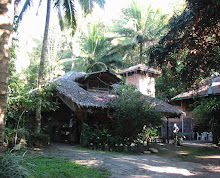It's 26 April 2024.
Approximately every 12 years, we complete a biographical cycle and begin a new one.
This is according to Siloist Doctrine, the study of the Horoscope, part of the Works of Self-Knowledge.
0 - 12
13 - 25 At age 24 I had a huge crisis in the Movement, in Tijuana, Mexico. Pisces year ("The end of things, the end of life") is the 12th year of each cycle.
26 - 38
39 - 51 At the start of my 39th year my marriage ended.
52 - 64 At age 53 I met my last great love, so that fits too (Aries year, beginnings).
Nine years later our relationship ended. We remained friends. He passed in 2021.
65 - 77 Hmm, I have 7 years to go before completing this "wheel" I am currently in.
I am leaving this place where I've lived (rented) for 9 years.
But first I will finish my first novel.
I started it in 2017!!!!! This is unbelievable. I thought I had begun it in 2019.
From 2015 to 2019 I was studying Filipino history in Spanish documentation. I mean, as concentratedly as I could. With many, many interruptions. I really began reading our history in Spanish starting in 1997. And Rizal's life starting in 1991.
I have always worked, not 9-5 but freelance work. Also I had a happy (though on-and-off) relationship between 2007 and 2015, and during those years I had already realized (1) I would not be able to live on writing and (2) the academic world was closed to me. So I said, enough of that, I'll just live my life.
Then this Spanish professor, Rocío Ortuño, who taught in UP, contacted me to ask: would I write for the Biblioteca Virtual Miguel de Cervantes, create a section dedicated to Rizal, his life, his works?
Sponsored by the University of Alicante. I said, "Yes!"
Full of self-doubt, it seemed such a difficult undertaking.
I wanted to write a contextualized bio of Rizal, not another hagiography. So this was what sparked my study of Filipino history in exclusively Spanish documentation, so I could understand Rizal's world and the historical moment he was born, lived and died in. Up until now, Rizal has been written about as if he were a disincarnate being floating in the stratosphere. It's taken for granted that modern Filipinos know the world of Rizal.
But they don't. How could we? We didn't live in his era, only in the shadow of it, a hundred years or more later.
It took me a long time. Too long. By 2019 the funding from a Spanish bank was withdrawn and the project of the "pestaña" (tab) on Rizal died. I don't know if someone else has done the job.
I did work long and hard on the bio, it was a PhD for me in:
1. Reading often difficult academic Spanish by very important Spanish and other historians who were/are recognized experts on Filipinas.
2. Learning to write in cultured, academic Spanish. I wrote a summary of each book I studied. I created vocabularies and more vocabularies.
3. Acquiring the most complete vision that I could on the arc of our Hispanic colonial history, economics, administration, the role and importance of the Church, the power relations between the monarch, the pope, and later between the administration, the religious orders, the archbishopric of Manila, and the principalía.
All of the above was my preparation for writing the historical novel I am working on now, which has now reached the 100K-word mark.
In my novel, Rizal also appears, and one other historical figure whom I discovered and fell in love with.
Anyway, I am leaving this place that has been a great blessing, where I began my novel and hope to finish it as soon as I can, this year.
Why am I writing it in Spanish?
To show that a Filipina who was not raised in a family grounded in Hispanic Filipino language, culture --- zip, purely U.S. culture --- can do it, with great effort, after shedding my U.S. transculturation and living for 41 years in a Latin American country, one that is very similar to Hispanofilipinas and is in fact the one most closely linked to our past through discovery by Magallanes.
If a girl, later an adult, who was completely U.S.-centered can slough off that powerfully-ingrained topsoil, reconnect with the underground springs, create literature that is based on our old language, her recovery of our old culture aided by its modern-atavistic version in Chile.....then it will prove that there is something there that is REAL. That can be revived in its essential fire and perfume, through dedicated study and communion with Latin America.
Something authentically ours.
It will prove to enough Filipinos that our past is invaluable. A priceless treasure.
We shall see what fruits my labors will ultimately yield, when I find a publisher for my first child.
It is a great experiment, the greatest of my life.
I am a continuer, as Arsenio Nicasio Katigback said (see photo), I am part of a tradition whose great defender (from the youngest cohort of my parents' generation), don Guillermo Gómez Rivera, gave me such a kind, warm and generous welcome in 2000 in Manila. A virtual friendship and mentorship grew. Thus I feel connected to the cultural tradition that he preserved, thanks to the friendship and guidance that he gifted me, and many, many others like José María (Pepe) Alas. He was our Hispanic-Filipino parent and guide, and example.


%20Luz-Katigbak%20Ancestral%20House%20(courtesy%20of%20Renz%20Marion%20Katigbak).jpg)

No comments:
Post a Comment